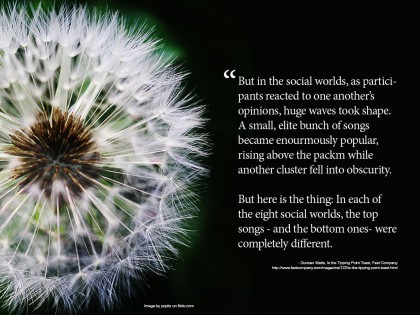Is a new ad unit on Facebook a potential resource for valuable knowledge, or an uncanny attempt to increase participation with traditional format ads – which seem to have a hard time creating good enough response on social networks.
Fallon Trend Point writes on the new possibilities of the video ad unit on Facebook. Making it possible for consumers to comment on ads and discuss them with friends by leaving comments inside the module
.
Read the post Social 10: Facebook’s New Social Video Ad Unit is an Engagement Magnet
This ad unit will be an interesting experiment, but as I write in the comments of the original post
. If one relates this opportunity to the thoughts of Duncan Watts it would be interesting to see if it generates any trustworthy value.
He states that while testing out how different groups of participants rated songs in a group they found that there was absolutely no coherence between any of the groups ratings. The most or least rated songs seemed totally random. And they all tended to follow the opinions of the first contributor
.
- “Working with two colleagues, Watts designed an online music-downloading service. They filled it with 48 songs by new, unknown, and unsigned bands. Then they recruited roughly 14,000 people to log in. Some were asked to rank the songs based on their own personal preference, without regard to what other people thought. They were picking songs purely on each song’s merit. But the other participants were put into eight groups that had “social influence”: Each could see how other members of the group were ranking the songs
regular intervals (the recommendation is six-monthly) for little blue pill Erectile dysfunction is often assumed to be a natural.
.
Watts predicted that word of mouth would take over
. And sure enough, that’s what happened. In the merit group, the songs were ranked mostly equitably, with a small handful of songs drifting slightly lower or higher in popularity. But in the social worlds, as participants reacted to one another’s opinions, huge waves took shape
. A small, elite bunch of songs became enormously popular, rising above the pack, while another cluster fell into relative obscurity.
But here’s the thing: In each of the eight social worlds, the top songs–and the bottom ones–were completely different.”
This would mean that all though this new functionality on Facebook might give a lot of comments and extended participation with an ad/video, the feedback can become highly random and possibly impossible to use as any form of qualitative insight.
It would be for increased participation, not valuable knowledge. Or?

